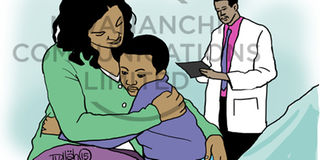PARENTING : How to break bad news to your child

What you need to know:
Your child needs simple, honest answers to his questions. And he needs to be reassured that he’s safe, that he’ll be taken care of, and that everyone is working to help the sick person get better — or at least feel better.
Parents sometimes think they’re protecting a child by not telling him someone’s sick, but 5- to 8-year-olds will pick up on it if family members are sad or whispering or the usual routines are disrupted. Your child needs simple, honest answers to his questions. And he needs to be reassured that he’s safe, that he’ll be taken care of, and that everyone is working to help the sick person get better — or at least feel better.
If it’s a parent who’s ill, a school-age kid may irrationally feel that he’s in some way to blame and need to be reassured that the sickness is not his fault. He might respond by withdrawing, having nightmares, or becoming disruptive at school. Even if the sick person is less close — a neighbour or a teacher — he’s likely to be anxious and worry that a parent will become ill too.
How to talk about a serious illness
First, think about what to say — and who should say it. Practice aloud the words you’ll use, like “Daddy’s heart is sick, and the doctors are trying to help him get better.” Keep it brief and then elaborate depending on how your child reacts. It’s okay to say you’re sad. “But if you think you’re going to be sobbing, it’s better to have somebody else tell your child,” says Diane Blum, executive director of Cancer Care, a national nonprofit that helps people affected by cancer.
Offer realistic reassurance: It’s not a good idea to say that everything will be fine unless you know that for sure. “You can say ‘Teacher Beth has good doctors and lots of people who are taking care of her. We really hope she’ll get better, but maybe she won’t,’” says Judith Myers-Walls, associate professor of child development and family studies at Purdue University.
Be prepared to talk again and again
Don’t expect to have one conversation and be done. Questions will emerge over time. You may have to explain more than once that someone is still sick and may not feel better for a while. You don’t need to give more information than your child asks for — details about medications and treatment would probably be too much.
Discuss hospital stays: If someone you know well goes to the hospital, tell your child about it. Because a child’s fantasies can be worse than reality, unless the patient is hooked up to lots of tubes and looking scary, Blum advises that a visit is usually reassuring. If your child can’t visit, ask him to make a special card or to help pick out flowers to send.
Talk about how the sick person might be feeling: You want to prepare your child for someone losing hair and things like that. You might say “Dad is going to have to take a nap when he gets home from the doctor’s office” or “My treatment is going to make my hair fall out, and I’m going to look really different. But it will grow back.”
Encourage expression through art and play. Drawings will tell you what’s going on in your child’s head. And giving your child a toy doctor kit or some real equipment to experiment with can also be a good way to help him deal with his feelings.
Be prepared to discuss death: If treatment does not go well, say something like “Doctors are doing everything they can to help Uncle Joe. But it’s not working, and he’s getting sicker.” Express your concerns: “We’re very worried about Aunt Sally.” This way, you prepare your child for the possibility of death.
Be careful not to say “No, Aunt Sally’s not going to die.” Instead, focus on what’s being done: “We feel bad she’s so sick, but the doctors are trying to help.” Be direct and use words your child can understand, like “dying,” “pain,” and “hurting.” Avoid confusing euphemisms like “passing away.”
Answers to common questions about serious illness: “Can I catch it?” If, like cancer, the condition isn’t contagious, say so. If it is contagious, like meningitis, tell your child: “That’s why we don’t want you to visit Grandpa for a while longer.” “Are you and Dad going to catch it?” You can’t promise you won’t become ill. But you can reassure. If an illness in the family is hereditary, say something like, “We’re going to take good care of ourselves so that we’ll stay healthy and safe.”
Email: [email protected]




